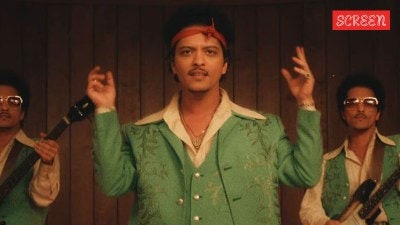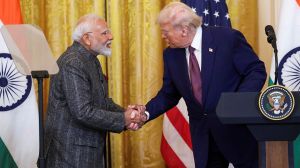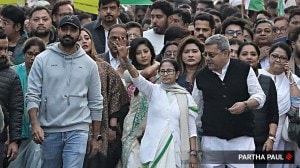Khamenei,an iron cleric,now blinking
For two decades,Ayatollah Ali Khamenei has remained a shadowy presence at the pinnacle of power in Iran....
For two decades,Ayatollah Ali Khamenei has remained a shadowy presence at the pinnacle of power in Iran. Through his control of the military,the judiciary and all public broadcasts,the supreme leader controlled the levers he needed to maintain an iron if discreet grip on the Islamic republic. But in a rare break from a long history of cautious moves,he rushed to bless President Mahmoud Ahmadinejad for winning the election,calling on Iranians to line up behind the incumbent.
Then angry crowds swelled in Iran,and he backpedaled,announcing that the 12-member Council of Guardians will investigate the vote.
After congratulating the nation for having a sacred victory,to say now that there is a possibility that it was rigged is a big step backward for him, said Abbas Milani,director of Stanford Universitys Iranian studies programme.
Analysts say Khamenei has opened a serious fissure in the face of Islamic rule and one that may prove impossible to patch over,particularly given the fierce dispute over the election that has erupted amid the elite veterans of the 1979 Islamic Revolution. Khamenei would always come and say,Shut up. What I say goes, said Azar Nafisi,the author of two memoirs about Iran,including Reading Lolita in Tehran. Now the myth that there is a leader up there whose power is unquestionable is broken.
In calling for the Guardian Council to investigate the vote,he has bought himself a 10-day grace period for the anger to subside,experts note. The outcome is not likely to be a surprise.
It is simply a faux investigation to quell the protests, said Karim Sadjadpour,an Iran specialist at the Carnegie Endowment for International Peace.
In the wake of the election debacle,questions are being raised about who controls whom. But over the years,Khamenei gradually surmounted expectations that he would be eclipsed.
He is a weak leader,who is extremely smart in allying himself,or in maneuvering between centres of power, said one expert at New York University,declining to use his name because he travels to Iran frequently. Because of the factionalism of the state,he seems to be the most powerful person.
But many analysts say the differences between factions have never been quite so pronounced nor public as in the past few days. Former President Ali Akbar Hashemi Rafsanjani,once a close Khamenei ally who helped him become supreme leader,sent an open letter to him in the days before the election warning that any fraud would backfire,Milani noted. If he allowed the military to ignore the public will and to destroy senior revolutionary veterans,the decision would haunt him,Rafsanjani warned: Tomorrow it is going to be you.
Everyone speaking of Khamenei tends to use the word cautious,a man who never gambles. But he now faces a nearly impossible choice. If he lets the demonstrations swell,it could well change the system of clerical rule. If he uses violence to stamp them out,the myth of a popular mandate for the Islamic revolution will die.
- 01
- 02
- 03
- 04
- 05































